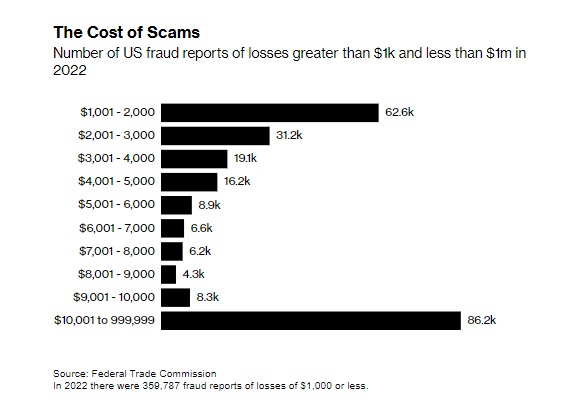- AI has given rise to a new wave of scams across industries, according to Bloomberg.
- U.S. consumers lost $8.8 billion in 2022, a surge of 44% compared to 2021, in attacks.
- Blockchain security company SloMist warns the crypto community against fake deposit frauds.
Earlier today, Bloomberg released a disrupting piece on the advanced technology that scammers are using on customers across the world. The article highlights how the explosion of AI tools threatens economies, including crypto, with a “blossoming of Ponzi schemes.”
In June, U.S. Federal Trade Commission Chair Lina Khan issued a report cautioning policymakers to note the “invasive forms of commercial surveillance” that AI used by tech giants bring about. Bloomberg’s article also mentioned the cost of AI-lead fraud, which has resulted in 86,200 cases of scams ranging from $10,000 to $1 million.
While AI has significantly heightened the ease for scammers to engage in exploitative activities, the vulnerability of financial markets to such attacks has remained a persistent concern. From 2021 to 2022, consumers in the U.S. lost $8.8 billion, an increase of 44%. Moreover, financial crime specialists at Wells Fargo & Co. and Deutsche Bank AG preach that apart from the monetary losses, businesses risk losing the “faith of burned customers.”
Additionally, the projected expense for cybercrimes across the globe might go as high as $8 trillion in 2023, surpassing the economic output of Japan, which ranks as the world’s third-largest economy.
In fact, leading crypto exchange Binance’s CEO Changpeng Zhao tweeted on August 2 about how he almost got robbed of $20 million. Zhao reported that scammers employed a strategy where they generated addresses featuring identical starting and ending letters. He stated that many users were susceptible to this scheme, as they tended to solely inspect the initial and concluding characters, neglecting to verify the middle segment of the wallet address. He further added,
Now, if you want to send to the legitimate address, you might just pick one previous transaction in your wallet and copy the address. You might just copy the wrong one. This is what happened yesterday, to a very experienced crypto operator.
Similarly, security firm SlowMist also warned the crypto community against an alarming rise of fake deposit attacks that cloud crypto exchanges. SlowMist shared that it had identified 12 attack strategies, including the “Zero Confirmation” method, enabling attackers to invalidate pre-block credited deposits.
Disclaimer: The information presented in this article is for informational and educational purposes only. The article does not constitute financial advice or advice of any kind. Coin Edition is not responsible for any losses incurred as a result of the utilization of content, products, or services mentioned. Readers are advised to exercise caution before taking any action related to the company.








